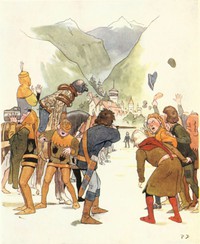William Tell Told Again by P. G. Wodehouse (web ebook reader .txt) 📗

- Author: P. G. Wodehouse
Book online «William Tell Told Again by P. G. Wodehouse (web ebook reader .txt) 📗». Author P. G. Wodehouse
Gessler and his men, Tell in their midst, bound and unarmed, embarked early in the afternoon at Fl�elen, which was the name of the harbour where the Governor's ship had been moored. Fl�elen was about two miles from K�ssnacht.
When they had arrived at the vessel they went on board, and Tell was placed at the bottom of the hold. It was pitch dark, and rats scampered over his body as he lay. The ropes were cast off, the sails filled, and the ship made her way across the lake, aided by a favouring breeze.
A large number of the Swiss people had followed Tell and his captors to the harbour, and stood gazing sorrowfully after the ship as it diminished in the distance. There had been whispers of an attempted rescue, but nobody had dared to begin it, and the whispers had led to nothing. Few of the people carried weapons, and the soldiers were clad in armour, and each bore a long pike or a sharp sword. As Arnold of Sewa would have said if he had been present, what the people wanted was prudence. It was useless to attack men so thoroughly able to defend themselves.
Therefore the people looked on and groaned, but did nothing.
For some time the ship sped easily on her way and through a calm sea. Tell lay below, listening to the trampling of the sailors overhead, as they ran about the deck, and gave up all hope of ever seeing his home and his friends again.
But soon he began to notice that the ship was rolling and pitching more than it had been doing at first, and it was not long before he realized that a very violent storm had begun. Storms sprung up very suddenly on the lake, and made it unsafe for boats that attempted to cross it. Often the sea was quite unruffled at the beginning of the crossing, and was rough enough at the end to wreck the largest ship.
Tell welcomed the storm. He had no wish to live if life meant years of imprisonment in a dark dungeon of Castle K�ssnacht. Drowning would be a pleasant fate compared with that. He lay at the bottom of the ship, hoping that the next wave would dash them on to a rock and send them to the bottom of the lake. The tossing became worse and worse.
Upon the deck Gessler was standing beside the helmsman, and gazing anxiously across the waters at the rocks that fringed the narrow entrance to the bay a few hundred yards to the east of Castle K�ssnacht. This bay was the only spot for miles along the shore at which it was possible to land safely. For miles on either side the coast was studded with great rocks, which would have dashed a ship to pieces in a moment. It was to this bay that Gessler wished to direct the ship. But the helmsman told him that he could not make sure of finding the entrance, so great was the cloud of spray which covered it. A mistake would mean shipwreck.
"My lord," said the helmsman, "I have neither strength nor skill to guide the helm. I do not know which way to turn."
"What are we to do?" asked Rudolph der Harras, who was standing near.
The helmsman hesitated. Then he spoke, eyeing the Governor uneasily.
"Tell could steer us through," he said, "if your lordship would but give him the helm."
Gessler started.
"Tell!" he muttered. "Tell!"
The ship drew nearer to the rocks.
"Bring him here," said Gessler.
Two soldiers went down to the hold and released Tell. They bade him get up and come with them. Tell followed them on deck, and stood before the Governor.
"Tell," said Gessler.
Tell looked at him without speaking.
"Take the helm, Tell," said Gessler, "and steer the ship through those rocks into the bay beyond, or instant death shall be your lot."
Without a word Tell took the helmsman's place, peering keenly into the cloud of foam before him. To right and to left he turned the vessel's head, and to right again, into the very heart of the spray. They were right among the rocks now, but the ship did not strike on them. Quivering and pitching, she was hurried along, until of a sudden the spray-cloud was behind her, and in front the calm waters of the bay.
Gessler beckoned to the helmsman.
"Take the helm again," he said.
He pointed to Tell.
"Bind him," he said to the soldiers.
The soldiers advanced slowly, for they were loath to bind the man who had just saved them from destruction. But the Governor's orders must he obeyed, so they came towards Tell, carrying ropes with which to bind him.
Tell moved a step back. The ship was gliding past a lofty rock. It was such a rock as Tell had often climbed when hunting the chamois. He acted with the quickness of the hunter. Snatching up the bow and quiver which lay on the deck, he sprang on to the bulwark of the vessel, and, with a mighty leap, gained the rock. Another instant, and he was out of reach.
Gessler roared to his bowmen.
"Shoot! shoot!" he cried.
The bowmen hastily fitted arrow to string. They were too late. Tell was ready before them. There was a hiss as the shaft rushed through the air, and the next moment Gessler the Governor fell dead on the deck, pierced through the heart.
Tell's second arrow had found its mark, as his first had done.
Chapter XV
There is not much more of the story of William Tell. The death of Gessler was a signal to the Swiss to rise in revolt, and soon the whole country was up in arms against the Austrians. It had been chiefly the fear of the Governor that had prevented a rising before. It had been brewing for a long time. The people had been bound by a solemn oath to drive the enemy out of the country. All through Switzerland preparations for a revolution were going on, and nobles and peasants had united.
Directly the news arrived that the Governor was slain, meetings of the people were held in every town in Switzerland, and it was resolved to begin the revolution without delay. All the fortresses that Gessler had built during his years of rule were carried by assault on the same night. The last to fall was one which had only been begun a short time back, and the people who had been forced to help to build it spent a very pleasant hour pulling down the stones which had cost them such labour to put in their place. Even the children helped. It was a great treat to them to break what they pleased without





Comments (0)